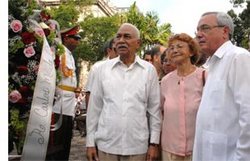Cubans Celebrate October 10
- Submitted by: admin
- Caribbean
- culture an traditions
- Destinations
- Education
- Granma
- history
- national
- personalities
- Society
- Politics and Government
- 10 / 11 / 2008

On the eve of the 140th anniversary of La Demajagua uprising, Cubans gathered at the statute of Carlos Manuel de Céspedes in the Plaza de Armas in Old Havana to pay tribute to the father of independence.
City of Havana historian Dr. Eusebio Leal addressed participants, speaking of how Céspedes started the uprising and liberated the slaves based on the conviction of equality for all, and that the armed struggle was the only way to achieve freedom.
“His idea of revolution was not an opportunist act. He represented a select and brave vanguard that knew how to draw in the popular classes. His actions tried to comply with those democratic basics that, with some good and bad decisions, would shape a Cuban path, a unique experience, an aspiration to attain all possible justice,” said Leal, author of the book El diario perdido de Carlos Manuel de Céspedes (The lost dairy of Carlos Manuel de Céspedes).
Floral wreaths from several institutions, ministries and individuals covered the statute of Céspedes.
Also attending the ceremony was the Commander of the Revolution Juan Almeida Bosque, who drew the ribbon of the floral wreath sent by Commander-in-chief Fidel Castro.
In this way, the essence of the speech pronounced by Fidel forty years ago at La Demajagua was still present. At that moment the leader of the Cuban Revolution said, “Our Revolution, its style, its characteristics, is very deeply rooted in the history of our homeland. That’s why we say, and it’s important that we understand this, that our revolution is a true revolution, and that this revolution began on October 10, 1868.”
(Juventud Rebelde)
Comments